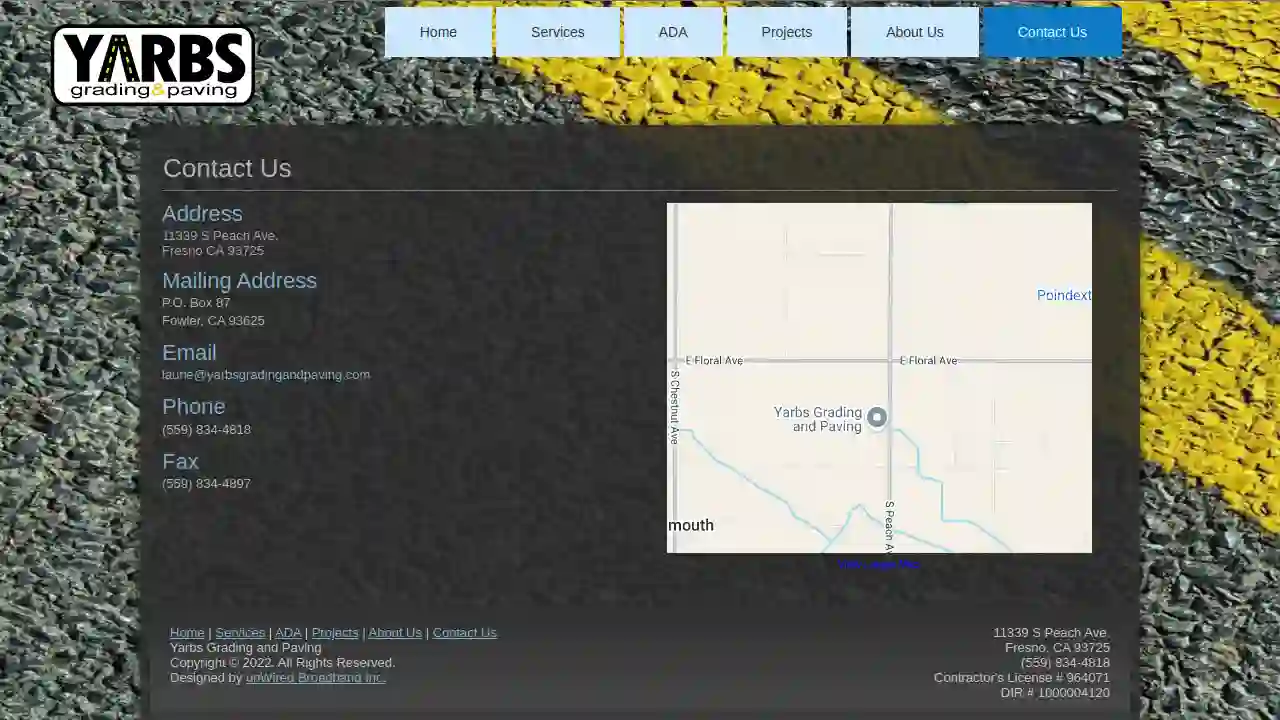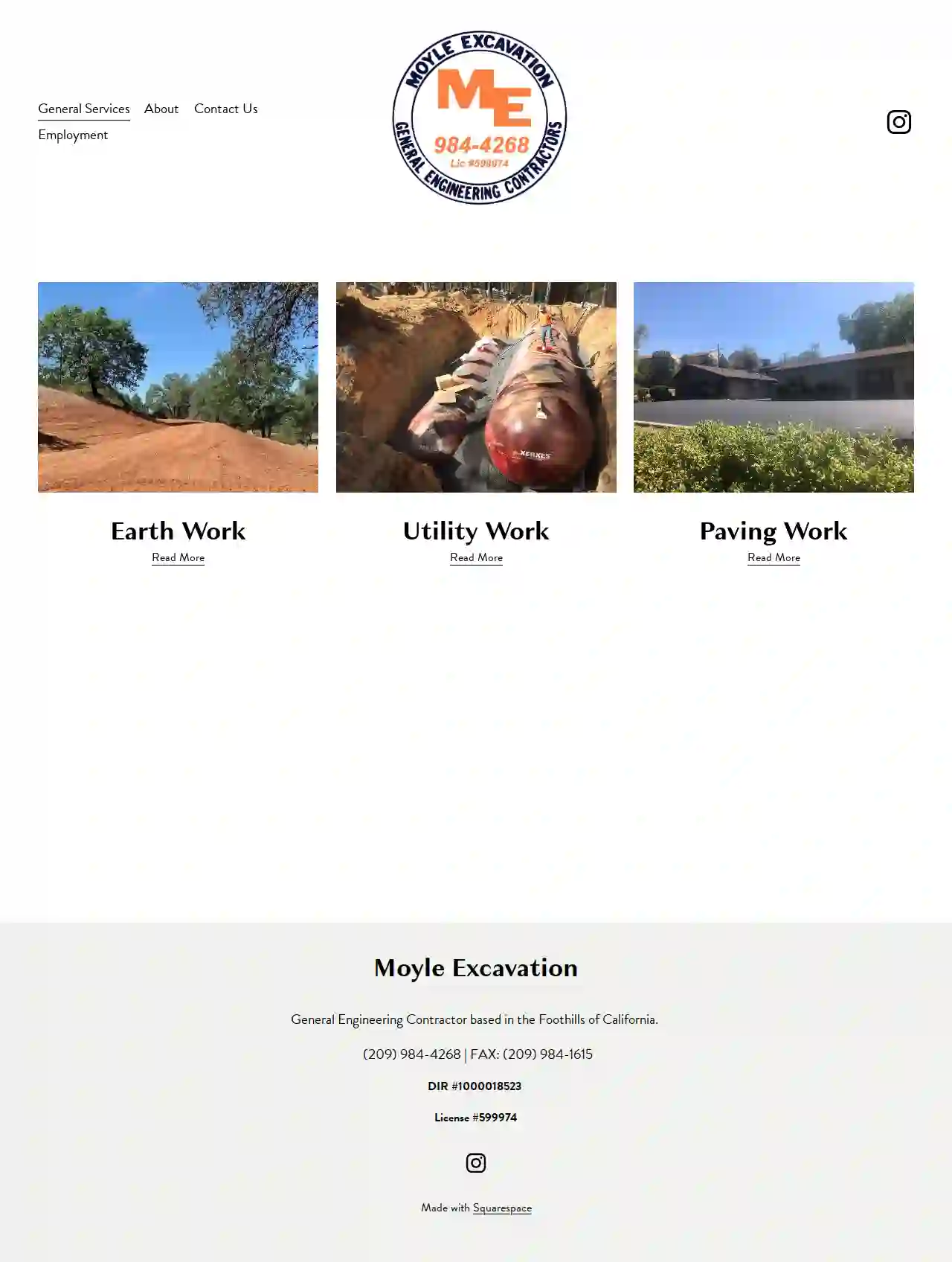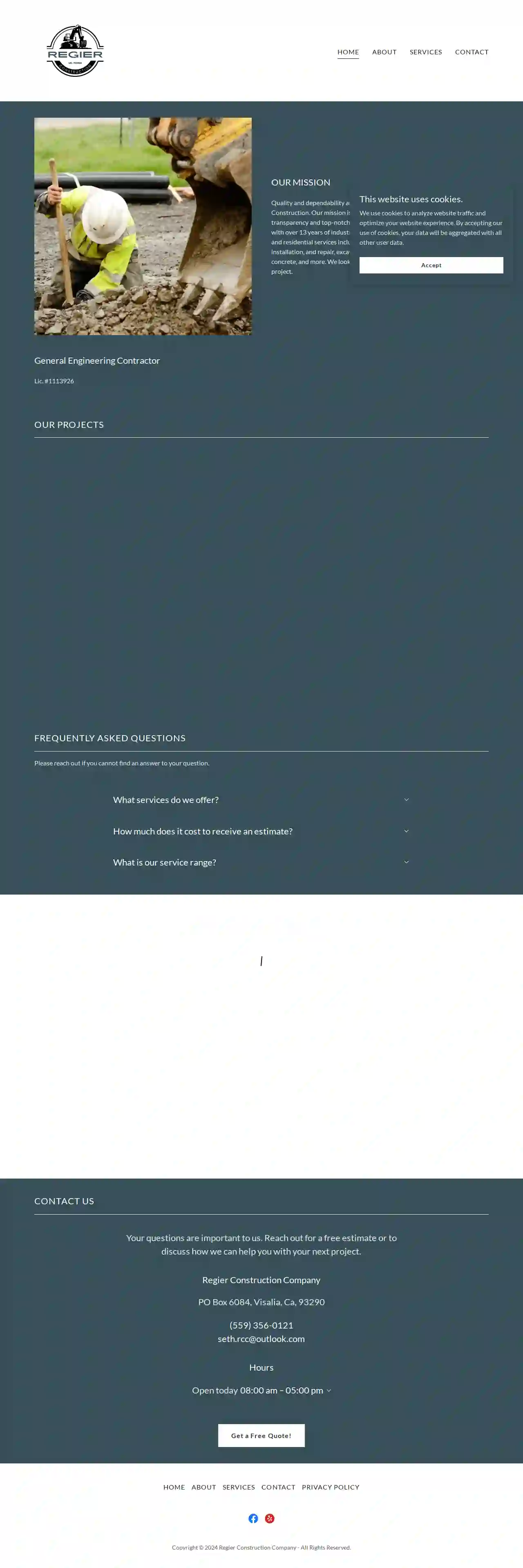Excavation Contractors Fresno
Find Excavating Contractor in Fresno
Get multiple Excavation Companies quotes for your project today! Compare profiles, reviews, accreditations, portfolio, etc... and choose the best offer.

Yarbs Grading and Paving
55 reviews11339 S Peach Ave., Fresno, 93725, USYarbs Grading and Paving: Your Trusted Partner for Quality Construction Yarbs Grading and Paving is a full-service grading and paving company located in Fresno, California. We have over 20 years of experience and are committed to delivering quality projects that meet or exceed our customers' expectations. We specialize in parking lot construction, ADA improvements, and city, county, and state roadway construction. Our team is dedicated to providing exceptional service and ensuring that every project is completed on time and within budget. We take pride in our work and strive to build lasting relationships with our clients. We offer a wide range of services, including: Concrete improvements Asphalt paving and overlays Mass excavation Underground Demolition Seal coating Striping We serve Fresno, Clovis, Madera, and the surrounding areas. Contact us today to discuss your project needs.
- Services
- Why Us?
Get Quote- T&
T&R Excavation LLC
1Fresno, US- Services
- Why Us?
Get Quote - As
Ashee Excavation Inc
1Fresno, US- Services
- Why Us?
Get Quote 
Moyle Excavation
51 reviewsP.O. Box 498, Jamestown, 95327, USAbout Moyle Excavation Moyle Excavation is a general engineering contractor serving Tuolumne County and neighboring areas for over 30 years, providing a wide range of services including excavation & grading, underground utilities, paving, and trucking. We handle projects of all sizes, from small residential sites to large-scale public projects. We take pride in building strong customer relationships and have a loyal base of repeat clients who appreciate our professionalism and commitment to delivering projects within budget and on schedule.
- Services
- Why Us?
- Our Team
- Gallery
Get Quote
Regier Construction Company
1PO Box 6084, Visalia, 93290, USOUR MISSION Quality and dependability are at the forefront of everything we do at Regier Construction. Our mission is for every one of our clients to experience transparency and top-notch customer service. Based in Visalia, California, and with over 13 years of industry experience we are pleased to offer commercial and residential services including, but not limited to, septic inspection, installation, and repair, excavation and grading, underground wet utilities, concrete, and more. We look forward to applying our expertise to your next project. General Engineering Contractor Lic. #1113926
- Services
- Why Us?
- Gallery
Get Quote- Qu
Quality Excavation
4.73 reviewsFresno, US- Services
- Why Us?
Get Quote - T
T M Grading, LLC
1Fresno, US- Services
- Why Us?
Get Quote - A
A J Excavation
3.73 reviewsFresno, US- Services
- Why Us?
Get Quote 
Palafox Prestige Construction, Inc.
517 reviewsTulare, USBuilding your visions. Creating reality. It's what we do. We'll get the job done! What We Do Our commercial & residential projects include both new construction and repairs/restorations. Occupied and fully operational job sites are never a problem. And we can also plan, manage, and build multi-phase jobs. Working Together We offer an end-to-end client experience that includes seamless communication, budgeting, staffing, on-site organization, and solid, quality handiwork every time. Why Choose Us? We work with architects and designers to produce beautiful, functional structures. Call us today and bring our project management skills and extensive construction experience to your next project.
- Services
- Why Us?
- Gallery
Get Quote- Gi
Gill-Reeves Co., Inc.
4.73 reviewsFresno, US- Services
- Why Us?
Get Quote
Over 21,512+ Excavation Contractors registered
Our excavation companies operate in Fresno and surrounding areas!
ExcavationHQ has curated and vetted Top Excavation Pros near Fresno. Find a top & reliable business today.
Frequently Asked Questions About Excavation Contractors
- Trench Collapses: Unstable trench walls can cave in, posing a severe risk to workers. Proper shoring and sloping are crucial safety measures.
- Utility Damage: Striking underground utilities (gas, water, electric) can cause leaks, explosions, or electrocution. Accurate utility locates and careful digging are essential.
- Falling Objects: Materials or equipment falling into excavations can injure workers. Securing work areas and using appropriate safety gear is vital.
- Equipment Accidents: Operating heavy machinery involves risks of rollovers, collisions, or mechanical failures. Trained operators and proper equipment maintenance are critical.
- Environmental Hazards: Excavated soil might contain hazardous materials (asbestos, lead). Proper testing and disposal procedures are necessary.
- Basement Size: The larger the basement, the more excavation is required, increasing the cost.
- Soil Type: Excavating rocky or dense clay soil is generally more expensive than loose soil.
- Accessibility: Difficult-to-access sites might require specialized equipment or more labor, driving up costs.
- Foundation Type: The chosen foundation type (full basement, crawl space, slab) affects excavation needs.
- Underpinning: If underpinning (strengthening existing foundations) is necessary, it significantly increases costs.
- Disposal Fees: Hauling excavated soil to disposal sites adds to the overall expense.
- Project Size and Scope: The larger and more complex the excavation, the higher the cost.
- Soil Type: Different soil types require different equipment and techniques, impacting costs. Rocky or clay-rich soil can be more expensive to excavate than loose soil.
- Accessibility: Difficult-to-access sites might require specialized equipment or additional labor, increasing expenses.
- Disposal Costs: Hauling away excavated material (soil, rocks, etc.) to disposal sites incurs additional fees.
- Permits and Inspections: Depending on local regulations, permits and inspections might be required, adding to the overall cost.
- Mechanical Excavation: Utilizing heavy equipment like excavators, backhoes, bulldozers, and loaders, suitable for most projects.
- Hand Excavation: Using hand tools (shovels, picks) for smaller excavations or delicate work near utilities.
- Blasting: Employing explosives to break up rock or hard materials, typically for large-scale projects.
- Hydro Excavation: Using high-pressure water jets to loosen and remove soil, often used for locating utilities or delicate excavation.
- Vacuum Excavation: Employing a vacuum system to suck up excavated material, suitable for safe excavation near utilities or in confined spaces.
What are the risks associated with excavation?
How much does it cost to excavate a basement?
How much does excavation cost?
What are the different methods of excavation?
What are the risks associated with excavation?
- Trench Collapses: Unstable trench walls can cave in, posing a severe risk to workers. Proper shoring and sloping are crucial safety measures.
- Utility Damage: Striking underground utilities (gas, water, electric) can cause leaks, explosions, or electrocution. Accurate utility locates and careful digging are essential.
- Falling Objects: Materials or equipment falling into excavations can injure workers. Securing work areas and using appropriate safety gear is vital.
- Equipment Accidents: Operating heavy machinery involves risks of rollovers, collisions, or mechanical failures. Trained operators and proper equipment maintenance are critical.
- Environmental Hazards: Excavated soil might contain hazardous materials (asbestos, lead). Proper testing and disposal procedures are necessary.
How much does it cost to excavate a basement?
- Basement Size: The larger the basement, the more excavation is required, increasing the cost.
- Soil Type: Excavating rocky or dense clay soil is generally more expensive than loose soil.
- Accessibility: Difficult-to-access sites might require specialized equipment or more labor, driving up costs.
- Foundation Type: The chosen foundation type (full basement, crawl space, slab) affects excavation needs.
- Underpinning: If underpinning (strengthening existing foundations) is necessary, it significantly increases costs.
- Disposal Fees: Hauling excavated soil to disposal sites adds to the overall expense.
How much does excavation cost?
- Project Size and Scope: The larger and more complex the excavation, the higher the cost.
- Soil Type: Different soil types require different equipment and techniques, impacting costs. Rocky or clay-rich soil can be more expensive to excavate than loose soil.
- Accessibility: Difficult-to-access sites might require specialized equipment or additional labor, increasing expenses.
- Disposal Costs: Hauling away excavated material (soil, rocks, etc.) to disposal sites incurs additional fees.
- Permits and Inspections: Depending on local regulations, permits and inspections might be required, adding to the overall cost.
What are the different methods of excavation?
- Mechanical Excavation: Utilizing heavy equipment like excavators, backhoes, bulldozers, and loaders, suitable for most projects.
- Hand Excavation: Using hand tools (shovels, picks) for smaller excavations or delicate work near utilities.
- Blasting: Employing explosives to break up rock or hard materials, typically for large-scale projects.
- Hydro Excavation: Using high-pressure water jets to loosen and remove soil, often used for locating utilities or delicate excavation.
- Vacuum Excavation: Employing a vacuum system to suck up excavated material, suitable for safe excavation near utilities or in confined spaces.